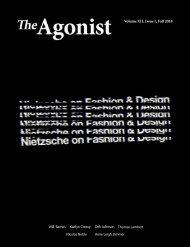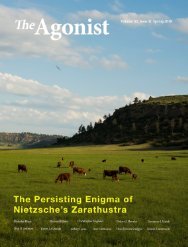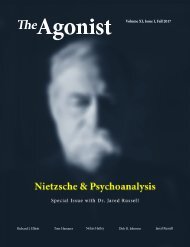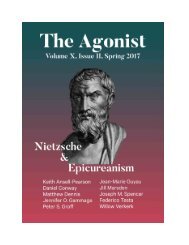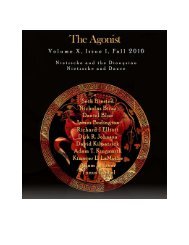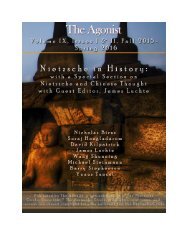Volume XII, Issue II, Spring 2019
You also want an ePaper? Increase the reach of your titles
YUMPU automatically turns print PDFs into web optimized ePapers that Google loves.
THE AGONIST<br />
today, if not this?... We are weary of man” (Genealogy of Morals 28). If, at first,<br />
species-extinction seems tragic, upon reflection, it is farcical. Even tragedies are<br />
exalted by the stories contained therein. Politics has entered an age of nihilism.<br />
As stated by Deleuze: “The kingdom of nihilism is powerful” (Nietzsche and<br />
Philosophy 171). The incapacity of humans, individually or collectively, to control<br />
our fate inhibits our capacity for action. However, inaction is an impossibility,<br />
and instead of not willing, humans will nothingness. The most alarming aspect of<br />
penetration of nihilism into political life is the triumph of passive or reactive<br />
forces. The last man is slavishly consumed by a purposeless happiness. As the<br />
world burns, they are content to casually eat their cake. If this exhibits the saying<br />
yes to life, affirming catastrophe, destruction, and extinction, it is a pitiful gaiety!<br />
The decadent and the hermits each stick their heads in the sand, resigned to fatal<br />
defeat and quiet sleep. The bitter and resentful lay blame and then scorn on a<br />
revolving litany of scapegoats. The preservation of life is touted as a political<br />
slogan justifying the sacrifice and destruction of life. The fascists, technocrats,<br />
and hopeful Sisypheans form an unholy alliance that delays extinction, extends<br />
suffering, and preaches shame.<br />
§ V – Will to Non-extinction<br />
The contrast between the experience of nihilism and the commandment to<br />
affirm life brings forth a final distinction: the will to power and the eternal return.<br />
The eternal return is a nihilistic experience, existence recurring inevitably without<br />
finale, meaning or aim, the same thing happening again and again without<br />
interruption. The eternal return is ambiguous because we have no way of knowing<br />
whether our present is at an ascending or descending moment in life. Nihilism is<br />
the half-way point of the eternal return. Responding at first passively then<br />
reactively, by affirming life we complete the loop.<br />
My interpretation of the will to power and the eternal return is uncommon.<br />
And as Tracy Strong warns: “The will to power and eternal return traditionally<br />
represent the greatest stumbling blocks in any interpretation of Nietzsche” (218).<br />
The will to power is pure vitality, a confluence of differential forces competing<br />
with each other, impelling the forward thrust of existence. The will to power is<br />
the movement of life. Vitality is a theory of life different from that of the organic:<br />
vitality is force, the organic is a substance. Thus, when Nietzsche claims that “[t]he<br />
fact is that will to power rules even in the inorganic world, or, rather, that there is<br />
no inorganic world” (quoted in Nietzsche and Philosophy 62), he is positing that<br />
nature, even that which appears dead and inert, is a living composite of forces.<br />
The will to power conceives of being as dynamic, always-already in a state of<br />
becoming. The will of the will to power is not intentional nor singular, but<br />
18



